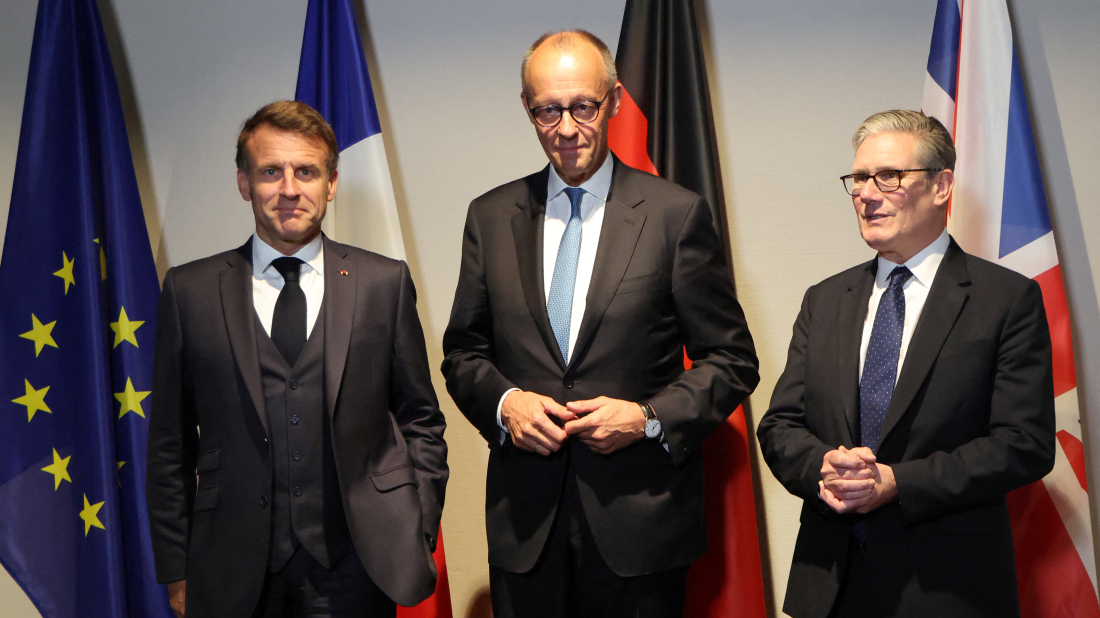Munich Security Conference to open amid doubts over U.S. commitment to Europe
Europe heads into the Munich Security Conference, on Friday (13 February), amid deepening unease over U.S. policy, as President Donald Trump’s hard-...

Britain, France and Germany are likely to trigger United Nations sanctions on Iran on Thursday over its nuclear programme according to sources, while giving Tehran 30 days to make commitments. Inspectors have returned for the first time since June, as talks have yet to yield concrete agreements.
The trio, known as the E3, met Iran on Tuesday in an effort to revive diplomacy over the nuclear programme before they lose the ability in mid-October to restore sanctions on Tehran that were lifted under a 2015 nuclear accord with world powers.
According to three European diplomats and one Western official, Tuesday’s discussions did not yield sufficient tangible commitments from Iran, though officials said there remained scope for further talks in the coming weeks.
The E3 have reportedly decided to trigger the so-called snapback of UN sanctions, potentially as early as Thursday, citing alleged violations of the 2015 deal aimed at preventing Tehran from developing nuclear weapons.
The United States and its allies argue that Iran’s nuclear activities exceed civilian needs, while Tehran denies seeking nuclear arms.
The UN process takes 30 days before sanctions targeting Iran’s financial, banking, hydrocarbons and defence sectors are restored.
“The real negotiations will start once the letter [to the U.N. Security Council] is submitted,” a Western diplomat said, speaking on condition of anonymity.
A German foreign ministry spokesperson confirmed that triggering the snapback remains an option for the E3.
British and French officials did not immediately respond to requests for comment. Tehran has warned of a “harsh response” should sanctions be reinstated.
Nuclear inspectors return to Iran
UN nuclear inspectors have returned to Iran for the first time since Tehran suspended cooperation following Israeli and U.S. strikes on its nuclear sites in June, Iranian state media reported Wednesday.
International Atomic Energy Agency (IAEA) chief Rafael Grossi said inspectors were allowed into the country, though no agreement has been reached on the scope of their work or access to nuclear facilities. Iranian Foreign Minister Abbas Araqchi told lawmakers that Tehran had not yet agreed on full cooperation with the watchdog, according to Iran's parliament news agency ICANA.
The E3 have offered to delay the snapback for up to six months to allow serious negotiations if Iran resumes full UN inspections and engages in talks with the U.S. Inspections would also aim to account for Iran’s large stock of enriched uranium, which has not been verified since the June strikes.
Iran has enriched uranium to 60% fissile purity, close to weapons-grade levels, and had sufficient material for six nuclear weapons before the Israeli strikes on 13 June, according to the IAEA. Producing an actual weapon would take longer, and the IAEA has said while it cannot confirm Tehran’s nuclear programme is entirely peaceful, there is no credible evidence of a coordinated weapons project.
Several rounds of talks were held between Iran and the United States before June. A diplomat said Iran showed signs of readiness to resume negotiations with Washington during Tuesday’s meeting with the E3, though an Iranian source said talks would only proceed if the U.S. guarantees no military strikes occur during negotiations.
Snapback
The “snapback” is a UN process that allows the automatic restoration of sanctions previously lifted under the 2015 nuclear deal with Iran if the country is found in violation. Once triggered, it gives the Security Council 30 days before sanctions on Iran’s financial, banking, energy, and defence sectors are reinstated.
Europe heads into the Munich Security Conference, on Friday (13 February), amid deepening unease over U.S. policy, as President Donald Trump’s hard-line stance on defence, trade and territory fuels doubts about Washington’s long-term commitment to transatlantic security.
James Van Der Beek, who rose to fame as Dawson Leery in the hit teen drama Dawson’s Creek, has died aged 48 following a battle with stage 3 colorectal cancer.
U.S. President Donald Trump and Prime Minister of Israel Trump hosted Netanyahu for closed-door talks focused on negotiations with Tehran, Gaza and wider rBenjamin Netanyahu ended a two-and-a-half-hour meeting at The White House on Wednesday without reaching agreement on how to move forward on Iran.
Norway’s Sturla Holm Laegreid, who won bronze in the men’s biathlon at the Milano Cortina 2026 Winter Olympics on Tuesday (10 February) in Italy, stunned viewers by publicly admitting he had cheated on his girlfriend and pleaded for another chance during post-race interviews.
Türkiye and Greece signalled renewed political will to ease long-standing tensions during high-level talks in Ankara on Wednesday (11 February). Maritime borders, migration and trade topped the agenda as both leaders struck a cautiously optimistic tone.
Europe heads into the Munich Security Conference, on Friday (13 February), amid deepening unease over U.S. policy, as President Donald Trump’s hard-line stance on defence, trade and territory fuels doubts about Washington’s long-term commitment to transatlantic security.
Start your day informed with AnewZ Morning Brief: here are the top news stories for the 13th of February, covering the latest developments you need to know.
Portugal's parliament approved a bill on Thursday (12 February), on its first reading, requiring explicit parental consent for children aged 13 to 16-years old to access social media, in one of the first concrete legislative moves in Europe to impose such restrictions.
A bipartisan group of 37 U.S. lawmakers have written to senior Taiwanese politicians expressing concern about parliament stalling proposed defence spending, saying that the threat posed by China has never been greater.
The Bangladesh National Party (BNP) won a decisive two-thirds majority in Friday's (13 February) general elections, a result expected to bring stability after months of tumult following the ouster of former Prime Minister Sheikh Hasina in a Gen Z-led uprising in 2024.
You can download the AnewZ application from Play Store and the App Store.

What is your opinion on this topic?
Leave the first comment